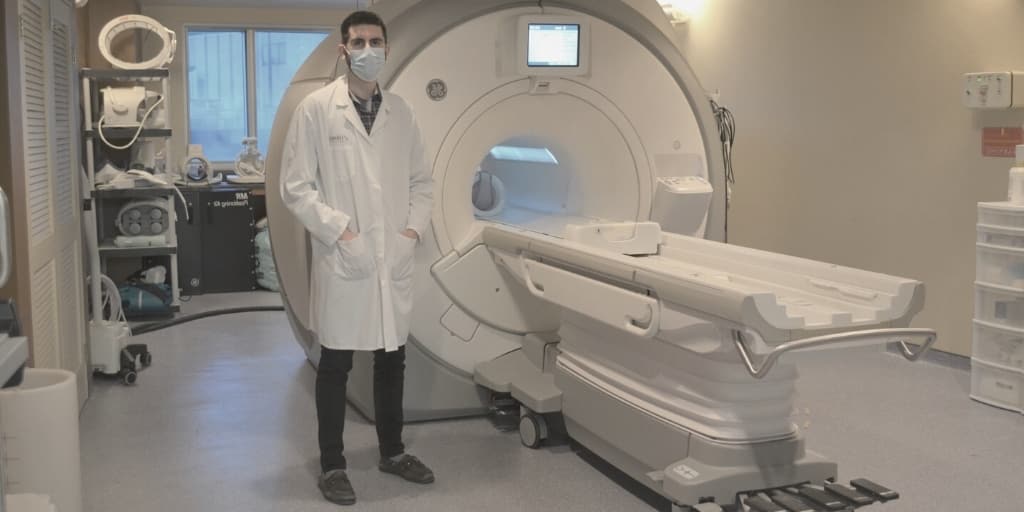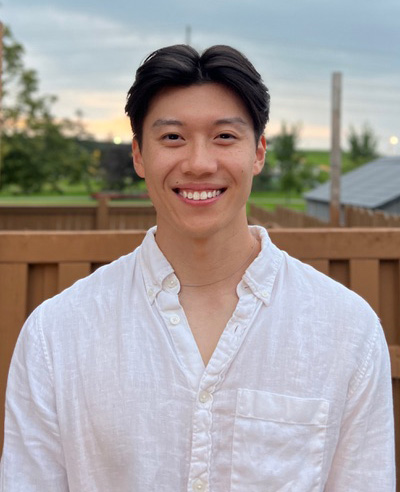1. Who are you? Tell us about yourself.
My name is Sean McRae, and I am a first-year master’s student in the Department of Medical Biophysics at Western University. I am undertaking my graduate training under Profs’ co-supervision: Timothy Scholl and John Ronald at the Robarts Research Institute.
2. Why is the TBCRU Studentship Award important to you?
The support from the TBCRU Studentship Award allows me to carry out important work in the field of breast cancer research amongst some of the leaders in the area. I was born and raised in London, so I am excited to collaborate with others in my home city to work towards new advancements that will benefit people in our community and further afield.
3. Tell us about your research. What are you doing, and what problems do you hope to solve?
I am working on an imaging system that will facilitate cell tracking of breast cancer cells using MRI. This is made possible through the engineering of breast cancer cells to express a gene called OATP1B3. This gene allows cells to take up and store an MRI contrast agent, allowing better visualization in the body. We are currently investigating new contrast agents with enhanced magnetic properties, which will allow for the detection of smaller numbers of engineered cancer cells. This will also potentially allow us to use lower doses of contrast agent, decreasing any potential toxicity.
4. Why is your research important? How can your research be applied in the real world?
Metastatic breast cancer is challenging to treat. My work aims to develop sensitive imaging methods to study the spread of breast cancer and its treatment. We hope that with our effective and non-invasive cellular monitoring system, we will be able to follow breast cancer as it metastasizes to better understand the metastatic process and ultimately be useful for the assessment of novel treatments of metastatic disease. We also anticipate that these same tools will help evaluate new therapies such as cell and immunotherapies for breast cancer and other diseases.
5. What inspired your research?
Like many others, I have known family members and friends who have been diagnosed with cancer. It can be easy to feel a sense of helplessness when loved ones are faced with difficult diagnoses. Breast cancer research is my way of being part of the solution and alleviating this sense of helplessness in myself. I have always enjoyed coming up with solutions to complex problems, which will serve me well in research. As a new graduate student, I have very quickly gained a strong sense of pride for research being done in London. The work that is happening in our city is truly one-of-a-kind.
6. Why are you passionate about breast cancer research?
While completing my undergraduate degree, I worked on a fourth-year thesis at the Juravinski Cancer Centre in Hamilton, Ontario. The team that I was a part of implementing new technology to make pre-treatment radiotherapy setup procedures less invasive for breast cancer patients. During my time working on this project, I met many breast cancer patients, and it was here that I saw the importance of striving for better diagnostic and treatment options for these patients.
7. Why do you think breast cancer research matters?
We must never become satisfied with our current level of knowledge when it comes to breast cancer or any cancer for that matter. This is not a one-size-fits-all disease, and it should not be treated as such. We need new minds to come together to achieve great things. More can be done and more that can be studied in our search for a cure.
8. What excites you about your work?
I remember learning about the work done previously in my lab– specifically by Dr. Nivin Nystrӧm, a past recipient of a TBCRU studentship award. Her reporter, gene MRI system, was able to detect breast cancer metastases on the order of thousands of cells (that’s a tiny number when discussing tumours)! Advancements like these highlight the strides that have been made in the field. I am excited by the collaboration between experts that lead to amazing discoveries. Health care is a vast, multidisciplinary field where each part of the puzzle is essential.
9. What do you see yourself doing in the future?
I hope to continue my graduate research work at the Ph.D. level and continue in cancer treatment/research by working as a Medical Physicist. This group of health care workers are often overlooked for the critical, life changing work they do daily, and I hope to one day join them.
10. What do you like to do when you aren’t working on research?
I am an avid guitar player and rock music admirer. I love playing in bands, recording music, achieving new sounds and recently, I have become interested in building guitars and guitar effects pedals. I love to play live music. Although COVID-19 has put a damper on this, for the time being, everyone has a “happy place,” and this is mine!
SUPPORT RESEARCHERS LIKE SEAN MCRAE BY CONSIDERING A DONATION TO THE BREAST CANCER SOCIETY OF CANADA. FIND OUT HOW YOU CAN HELP FUND LIFE-SAVING RESEARCH, VISIT BCSC.CA/DONATE TODAY.




